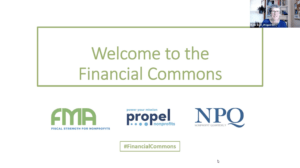October 19, 2011; Source: Evangelical Council for Financial Accountability | Let God guide the management of your tax-exempt endowments, says R. Scott Rodin, the author of a new monograph released by the Evangelical Council for Financial Accountability (EFCA). His paper is titled “Toward a Theology of Endowment Keeping.”
A theology? For faith-based organizations such as those monitored by EFCA, the question of devoting resources to immediate needs—such as a devastating flood in New Orleans, a famine in the Horn of Africa, or hundreds of thousands of refugees fleeing from instability and conflict in the nations of the Middle East—versus keeping a portion, a large portion, in tax-exempt endowments is more than just an issue of calculating a spending rate to keep an endowment alive and functioning in perpetuity. It is a moral question, a question of religion and belief.
Sign up for our free newsletters
Subscribe to NPQ's newsletters to have our top stories delivered directly to your inbox.
By signing up, you agree to our privacy policy and terms of use, and to receive messages from NPQ and our partners.
In Rodin’s paper, there are some intriguing insights worth the contemplation of believers and apostates alike:
- Why a theology of endowments?“We learn from Scripture and especially the teachings of Jesus that, while money is a neutral medium of exchange, powerful forces accompany it which, if left unchecked, will seek to control us. By understanding and acknowledging the spiritual forces behind money and possessions, we can ask the right questions with regard to how our money is earned, invested, given and saved.”
- The payout challenge: “If we hold endowments in perpetuity, we can be assured of one absolute fact; when Christ returns, He will find billions of dollars sitting in portfolios of Christian organizations, churches and institutions, and He will also find a world of unmet needs; poverty, hunger, abuse of every fashion, environmental degradation, relational brokenness, and millions who have never heard the Gospel of Jesus Christ. What will He say to those institutions that held on tightly to all endowed funds, releasing only the very minimum required by law while ministry needs went unmet?”
- The “institutional bondage” danger: “As our dependence on endowment funds grows, and our trust and hope for our future become associated with the health of the endowment, we will come under the bondage that such allegiance produces. In our private lives, when we place our trust and faith in anything material, it will begin to dominate us. . . . If we allow an ownership mentality to seep into our handling of our endowment, followed by a shift in our trust from God to accumulating assets, what follows is a hording mindset. If the endowment is the locus of our trust, then spending it, any of it, can become an anathema to an institution.”
It is a paper full of keen insights into endowment management whether you accept the biblical references or not. Rodin finds plenty of Old Testament passages justifying endowments (Genesis 41:34-37, Exodus 16:4-5, Leviticus 25:20-22, 2 Chronicles 31:2-15, Acts 4:32-35) as well as New Testament admonitions of caution (Luke 12:15-20, Matthew 6:19-20, 1 Timothy 6:17-19). No one can read Rodin’s paper, even they disagree in part or in whole, without gaining insight and perspective.—Rick Cohen













